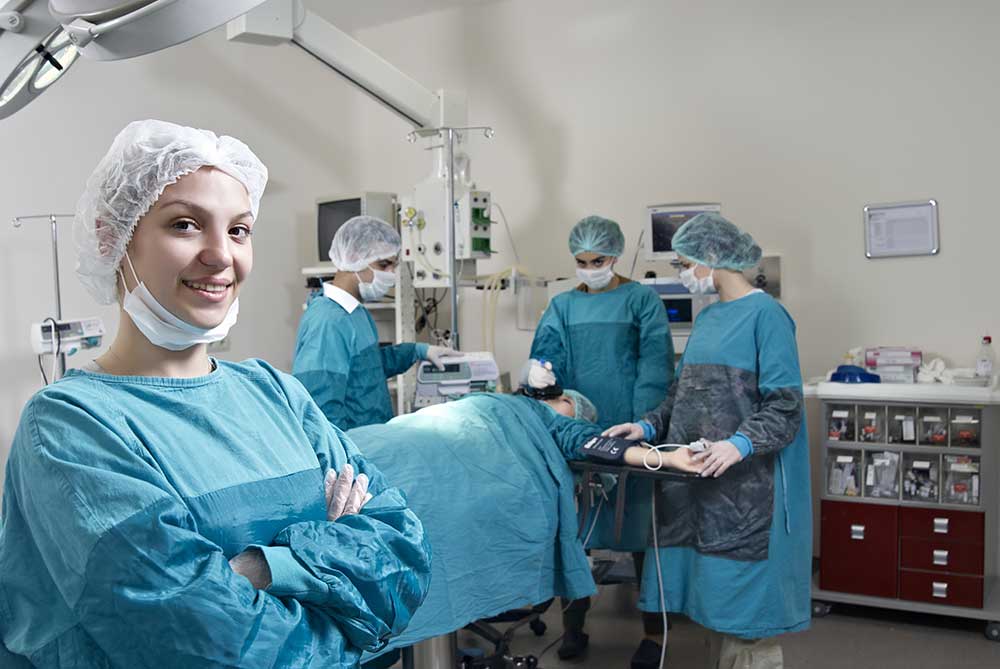Disclaimer: The information on our website is provided for general information purposes only. We make no representations or warranties of any kind, express or implied, about the completeness, accuracy, reliability, suitability or availability with respect to the website or the information contained on our website for any purpose. Any reliance on such information is therefore strictly at your own risk and we are not liable for any damages or losses arising out of or resulting from your reliance on any information contained on our website.
Surgical assistants are vital members of an operating room team and help surgeons with a variety of tasks before, during, and after surgery. These assistants have a very active role during surgery and can find themselves performing a number of tasks such as suturing patients, holding instruments, helping to stop bleeding, positioning patients, and much more.
Watch a video to learn what a surgical assistant does:
How to Become a Surgical Assistant

To become a certified surgical assistant you must pass the Certified Surgical Assistant (CSA) exam from the certification board called the National Commission for the Certification of Surgical Assistants (link opens in a new tab). To qualify to sit for the exam, you must graduate from an accredited surgical assistant program (link opens in a new tab). You can also sit for the exam if you were trained to be a surgical assistant by the U.S. military.
According to O*NET OnLine, 25% of surgical assistants surveyed held an associate’s degree while a little more than 30% held a certification.
Job Description of a Surgical Assistant
The National Surgical Assistant Association explains that surgical assistants may perform duties under a surgeon’s supervision such as opening and closing surgical sites, harvest grafts, dissect tissue, remove tissue, implant devices, and alter tissue. They may also be skilled to apply and remove splints, casts, catheters, IV’s, arterial lines, and administer local anesthesia. During surgery, they also assist to maintain an unobstructed area for the surgeon to work using a variety of means which could include suctioning, sponging, or using retractors.
Other vital tasks include verifying the identity of the patient and the location on the patient in which the operation is taking place. They also assist to maintain a sterile and safe working environment by covering patients with surgical drapes and position patients so that they do not suffer from nerve damage after the surgery.
Surgical Assistant Career Video Transcript
Have you ever seen footage of surgeries and wondered who all those people in the operating room were? Surgical technologists and surgical assistants ensure the operating room is ready for each procedure, and work under the direction of surgeons to assist with surgical procedures. Surgical technologists and assistants know the terminology and tools needed for many different types of surgeries. They prepare the equipment and supplies, and assist the surgical team to scrub and put on gloves, masks, and sterile gowns.
During the operation, they make sure surgeons have the instruments they request at a moment’s notice. They may hold retractors, cut sutures, and apply or assist with applying bandages, then transfer patients to recovery. They are also responsible for counting sponges, needles and other instruments before and after the operation. In addition to technologist tasks, surgical assistants may operate suction equipment or suture a wound. Surgical technologists and assistants work in hospitals and outpatient surgery centers.
Their work environment requires a comfort level with blood, body fluids, and critically ill patients. They sometimes work overnight shifts, or are on call for emergencies. Surgical technologists need a certificate or associate’s degree in surgical technology. Surgical assistants typically have experience as a surgical technologist or have completed a formal education program in surgical assisting. Surgical technologists’ work spans from the mundane and routine to urgent and critical, all with the focus on saving lives and aiding healing.
Article Citations
National Surgical Assistant Association. About. NSAA.net
National Commission for the Certification of Surgical Assistants. Certification Requirements.
National Center for O*NET Development. 29-2099.07. O*NET OnLine.
The career video is in the public domain from the U. S. Department of Labor, Employment and Training Administration.

